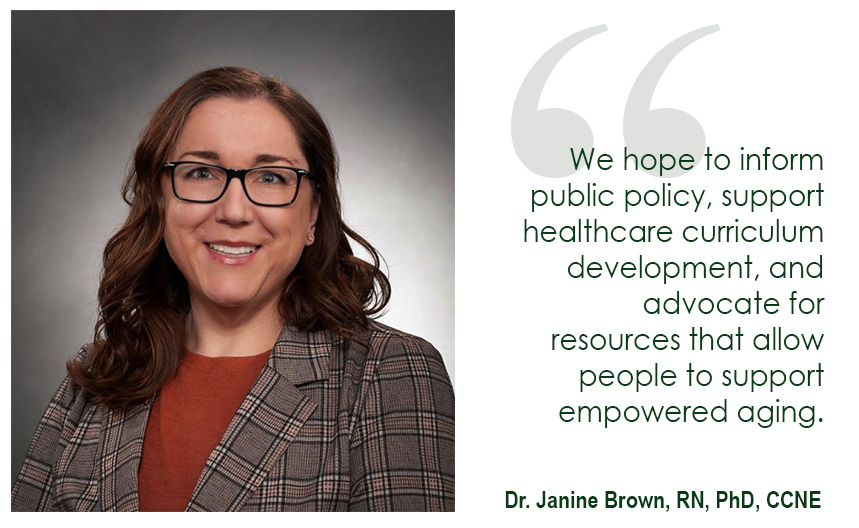Supporting Equitable and Empowered Aging
Nursing Associate Professor Leads Study on End-of-Life Planning
Are there unmet needs, system gaps, barriers, and vulnerabilities that influence older Canadians' end-of-life care planning and decisions?
This sobering question is at the heart of a new four-year, three-province study led by Dr. Janine Brown, Associate Professor in the University of Regina's Faculty of Nursing. With $358,000 in funding from the Social Sciences and Humanities Research Council (SSHRC), this project explores how shifting social and political realities may be influencing how older adults in Canada approach end-of-life (EOL) care planning.
 The media has reported stories with statements such as: "I feel like I'm falling through the cracks, so if I'm not able to access health care, am I then able to access death care?" Brown said that these stories piqued the research curiosity to explore if social factors are influencing some Canadians' EOL planning and decisions.
The media has reported stories with statements such as: "I feel like I'm falling through the cracks, so if I'm not able to access health care, am I then able to access death care?" Brown said that these stories piqued the research curiosity to explore if social factors are influencing some Canadians' EOL planning and decisions.
Dr. Brown's project "Understanding the Impact of the Social-Political Contexts in Shaping Older Adult Canadians' End-of-Life Planning" is investigating the convergence of affordability, climate change, health system strain, and evolving options such as medical assistance in dying (MAID). She is partnering with Dr. Kathy Kortes-Miller (Lakehead University) and Dr. Tracy Powell (Mount Royal University), both respected leaders in end-of-life and palliative care research.
"End-of-life planning has become increasingly complex as Canadians age, and there has been an exacerbation of social and political contexts potentially influencing Canadians' choices. We're particularly interested in whether these contexts are influencing Canadians' end-of-life care decisions," said Dr. Brown. "And if they are, what improvements to social and public policy related to aging support may be required."
The study comes at a critical time. Seniors now make up more than 18% of Canada's population, and that figure is expected to continue to increase. Despite this demographic shift, Dr. Brown noted that policies and systems haven't kept pace with the realities facing older Canadians. The aging adult population has significant implications across various sectors, including healthcare, housing, and social services.
 The research team will gather in-depth qualitative data from older adults and key informants from three provinces. Their goal is to identify not only the challenges but also opportunities for meaningful change.
The research team will gather in-depth qualitative data from older adults and key informants from three provinces. Their goal is to identify not only the challenges but also opportunities for meaningful change.
"We hope to inform public policy, support healthcare curriculum development, and advocate for resources that allow people to support empowered aging," explained Dr. Brown.
Each research team member brings unique strengths to the project. Dr. Kortes-Miller is a social worker and Director of the Centre for Education and Research on Aging and Health with experience in creative knowledge-sharing tools such as podcasts and digital storytelling. Dr. Powell has more than 25 years of expertise in nursing, oncology, and bereavement.
The project also creates opportunities for student engagement at the University of Regina and partner institutions to assist with interviews, data analysis, and knowledge mobilization activities like website development, manuscript preparation and presentations.
Dr. Brown said she hopes the findings will spark dialogue and action across the healthcare system, among older adult Canadians and their families, and within governments and support agencies. "I want to see a future where Canadians make end-of-life decisions that are best for them under the best of circumstances," she said. "Our research is about understanding how society can support that."